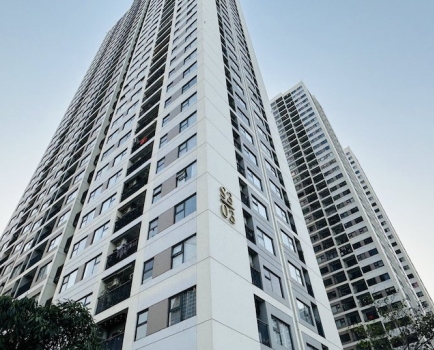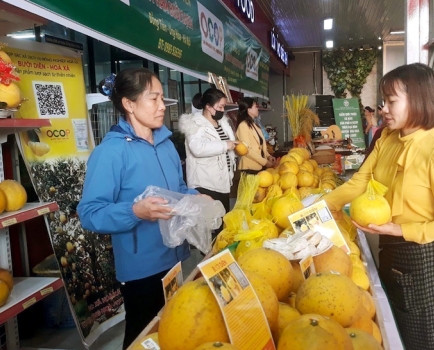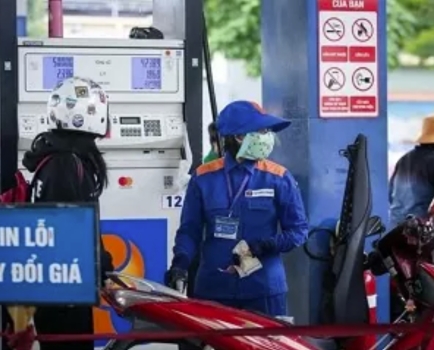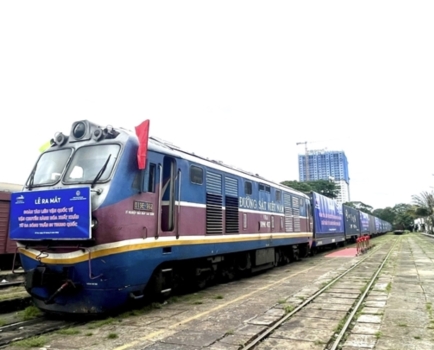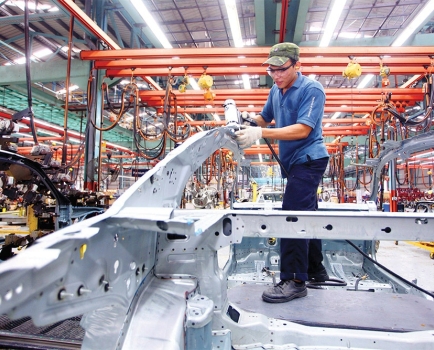New cooperation areas between Việt Nam and Hong Kong
Mon, 12 Aug 2024 10:57:00 | Print | Email Share:
The recent visit to Việt Nam of a high-level delegation led by John Lee Ka-Chiu, chief executive of the Hong Kong Special Administrative Region (HKSAR) of China, marks a significant milestone in strengthening bilateral relations and opening new avenues for cooperation.
 |
| Deputy Prime Minister Trần Lưu Quang (1st right) and Chief Executive of the Hong Kong Special Administrative Region (China) John Lee Ka-chiu (1st left) witness the exchange of a MoU on financial cooperation between Việt Nam’s Ministry of Finance and Hong Kong's Financial Services and the Treasury Bureau. — VNA/VNS Photo An Đăng |
The recent visit to Việt Nam of a high-level delegation led by John Lee Ka-Chiu, chief executive of the Hong Kong Special Administrative Region (HKSAR) of China, marks a significant milestone in strengthening bilateral relations and opening new avenues for cooperation.
This landmark trip, which also included visits to Laos and Cambodia, underscores Hong Kong’s commitment to building stronger connections and exploring new areas of collaboration with these ASEAN countries.
As the first official visit to Việt Nam by a chief executive of the Hong Kong SAR, it yielded impressive results, including the signing of 30 agreements aimed at bolstering cooperation in trade, investment, aviation, technology, and education.
Hong Kong has long been an important partner for Việt Nam in both trade and investment. In 2023, Việt Nam became Hong Kong’s seventh-largest merchandise trading partner and second among ASEAN countries, trailing behind Singapore.
Bilateral trade in goods reached HK$245.6 billion (US$31.4 billion), with an average annual growth rate of 11.6 per cent from 2019 to 2023, illustrating dynamic economic interactions.
Notably, about 8 per cent of the merchandise trade between Việt Nam and mainland China, amounting to HK$146.3 billion (US$18.7 billion), was via Hong Kong in 2023.
In terms of foreign direct investment (FDI), Hong Kong stands as the fifth-largest foreign investor in Việt Nam, with accumulated investments totalling US$34.1 billion.
In 2023 alone, Hong Kong was the third-largest foreign investor in Việt Nam, contributing US$4.68 billion, accounting for 12.8 per cent of total FDI.
This trend continued in the first seven months of 2024, with Hong Kong becoming the second-largest FDI investor, contributing over US$2.19 billion, more than double the amount from the previous year.
Việt Nam, described by the World Bank as a "development success story", is pushing for economic reforms that have propelled it to a middle-income economy within a generation.
Committed to becoming a high-income country by 2045, Việt Nam’s economic aspirations align well with the opportunities presented by its partnership with Hong Kong.
New momentum for cooperation
In an interview with Việt Nam News, Hong Kong’s Deputy Financial Secretary Michael Wong emphasised several key areas of focus in future cooperation.
 |
| Michael Wong, deputy Financial Secretary of the HKSAR (centre), and Nicholas Ho, commissioner for Belt and Road (left), in an interview with Việt Nam News reporter. — Photo courtesy of HKSAR |
Efforts are underway to restore the number of weekly passenger flights between Việt Nam and Hong Kong to pre-COVID levels, aiming to increase from the current more than 60 flights per week to nearly 120.
Enhancing air services is expected to boost tourism, benefiting both economies and cultures. During Chief Executive Lee's visit, an MoU was signed between Hong Kong's Airport Authority and the Airports Corporation of Vietnam to enhance air connectivity.
Wong highlighted financial services as another promising area for collaboration. As an international financial hub with a market capitalisation of around US$4 trillion, Hong Kong offers significant opportunities for Vietnamese companies seeking capital for expansion.
Hong Kong’s diverse capital sources, including those from mainland China and international markets, provide a valuable resource for Vietnamese companies. An MoU signed between the Hong Kong Financial Services and Treasury Bureau and Việt Nam’s Ministry of Finance aims to facilitate communication and knowledge exchange in finance.
Both Hong Kong and Việt Nam are committed to achieving carbon neutrality by 2050. Hong Kong’s experience in issuing green bonds under its Government Sustainable Bond Programme can support Việt Nam’s green transition, providing capital and expertise for sustainable development projects, according to Wong.
He said that innovation and technology would be major focuses in Hong Kong over the coming years, particularly in life sciences, AI, data analytics, advanced manufacturing, and robotics. Việt Nam shares a strong interest in these fields.
Hong Kong’s Science Park, with its concentration of I&T operations, stands as a potential hub for these collaborative efforts.
“Over the next 5 to 20 years, significant investments will enhance cooperation, making previously impossible ventures achievable. This includes potential investments from visionary Vietnamese enterprises in Hong Kong, possibly even establishing manufacturing operations there,” Wong said.
 |
| Hong Kong, the most open international commercial and financial hub in China, offers significant opportunities for Vietnamese companies seeking capital for economic development. — Photo courtesy of HKSAR |
Belt and Road Initiative
The Commissioner for Belt and Road, Nicholas Ho, emphasised the pivotal role of the Belt and Road Initiative (BRI) in advancing cooperation. He highlighted Hong Kong’s unique position as a “super value adder” through its professional services, innovation, and connectivity, crucial for the BRI’s infrastructure projects. These collaborations are expected to bring significant benefits to both Việt Nam and the HKSAR.
Hong Kong is actively enhancing its engagement with Việt Nam through various BRI initiatives. Among these efforts is education exchange, with Việt Nam receiving a significant portion of the 2,500 BRI scholarships awarded in Hong Kong.
Additionally, over 1,600 Hongkongese students participated in youth exchanges to Belt and Road countries last year. Looking ahead, we aim to expand internship programmes in collaboration with Việt Nam, Ho said.
Hong Kong’s role is also evident in major infrastructure projects in Việt Nam, such as the tallest tower, constructed with Hong Kong’s professional services.
Moreover, Hong Kong acts as a gateway for Chinese companies entering the Vietnamese market, leveraging its advantages in dispute resolution and common law. Over the past five years, more than 320 Hongkongese SMEs have applied for government funding to expand into Việt Nam.
The growing involvement of Hong Kong in Việt Nam spans various sectors, including fintech, new energy, financial institutions, and professional services. This trend reflects an expanding economic and technological partnership between the two parties.
A recent development in the cooperation between Hong Kong and Việt Nam is Hong Kong's relaxation of visa policies and talent admission schemes, making it easier for Vietnamese professionals and businesspeople to obtain multiple-entry visas.
Since this policy change on October 25, 2023, over 1,440 multiple-journey visit visas have been approved for Vietnamese citizens travelling to Hong Kong, marking a substantial increase compared to the monthly average in 2019.
“The people-to-people connectivity is one of the five key connectivities of the Belt and Road Initiative and is arguably the most fundamental for global collaboration. The Việt Nam-Hong Kong collaboration on people-to-people bonds has never been stronger,” said Ho.
The visit by the Hong Kong delegation underscores a commitment to not only strengthening existing ties but also exploring new avenues of cooperation. The emphasis on tourism, talent exchange, financial services, the Belt and Road Initiative, innovation and technology, green finance, and educational exchanges highlights a comprehensive approach to deepening the relationship between Việt Nam and Hong Kong.
As these collaborative efforts unfold, they are expected to bring significant economic and cultural benefits to both Việt Nam and the HKSAR, paving the way for a prosperous future.
By: VNS/ Vietnam Economic News
Source: https://ven.congthuong.vn/new-cooperation-areas-between-viet-nam-and-hong-kong-52157.html
---------------------------------------------
Same category News :




